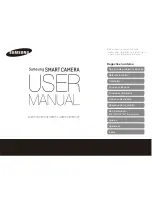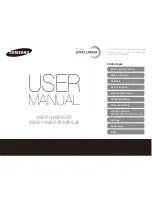
12.3
Battery safety warnings
■
Do not place the battery in fire or heat the battery.
■
Do not install the battery backwards so that the polarity is reversed.
■
Do not connect the positive terminal and the negative terminal of the battery to
each other with any metal object (such as wire).
■
Do not pierce the battery with nails, strike the battery with a hammer, step on the
battery, or otherwise subject it to strong impacts or shocks.
■
Do not solder directly onto the battery.
■
Do not expose the battery to water or salt water, or allow the battery to get wet.
■
Do not disassemble or modify the battery. The battery contains safety and protection
devices which, if damaged, may cause the battery to generate heat, explode or
ignite.
■
Do not place the battery on or near fires, stoves, or other high-temperature locations.
■
When the battery is worn out, insulate the terminals with adhesive tape or similar
materials before disposal.
■
Immediately discontinue use of the battery if, while using, charging, or storing the
battery, the battery emits an unusual smell, feels hot, changes color, changes
shape, or appears abnormal in any other way. Contact your sales location if any
of these problems are observed.
■
In the event that the battery leaks and the fluid gets into one’s eye, do not rub the
eye. Rinse well with water and immediately seek medical care. If left untreated the
battery fluid could cause damage to the eye.
■
When charging the battery, only use a specified battery charger.
■
Do not attach the batteries to a power supply plug or directly to a car’s cigarette
lighter.
■
Do not place the batteries in or near fire, or into direct sunlight. When the battery
becomes hot, the built-in safety equipment is activated, preventing the battery from
charging further, and heating the battery can destroy the safety equipment and
can cause additional heating, breaking, or ignition of the battery.
■
Do not continue charging the battery if it does not recharge within the specified
charging time. Doing so may cause the battery to become hot, explode, or ignite.
■
The temperature range over which the battery can be charged is 0–+45 °C
(+32–+113 °F). Charging the battery at temperatures outside of this range may
cause the battery to become hot or to break. Charging the battery outside of this
temperature range may also harm the performance of the battery or reduce the
battery’s life expectancy.
■
Do not discharge the battery using any device except for the specified device.
When the battery is used in devices aside from the specified device it may damage
the performance of the battery or reduce its life expectancy, and if the device
causes an abnormal current to flow, it may cause the battery to become hot, ex-
plode, or ignite and cause serious injury.
12
132
Publ. No. 1557954 Rev. a155 – ENGLISH (EN) – February 7, 2006
12 – Electrical power system
Summary of Contents for ThermaCAM P65
Page 2: ......
Page 4: ......
Page 6: ......
Page 7: ...ThermaCAM P65 User s manual Publ No 1557954 Rev a155 ENGLISH EN February 7 2006...
Page 16: ...xvi Publ No 1557954 Rev a155 ENGLISH EN February 7 2006...
Page 80: ...INTENTIONALLY LEFT BLANK 8 64 Publ No 1557954 Rev a155 ENGLISH EN February 7 2006 8 Tutorials...
Page 245: ......
















































